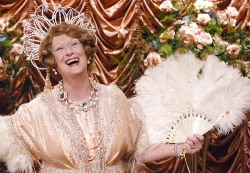Florence
Foster Jenkins

Florence
Foster Jenkins proves you can
overcome any obstacle if you are a rich, delusional white woman.
Set in the 1940s, Jenkins (Meryl Streep) is a patron of the arts in New
York City’s High Society crowd as the war wages on across the
globe.
While she has a deep, burning love for singing, she is horrible at it.
Absolutely dreadful.
Historically awful.
Even Auto Tune could not save her.
Yet, she puts on small parlor concerts with her loving husband, St.
Clair (Hugh Grant), who ensures the crowd is full of friends and anyone
who might have a bad word to say is dissuaded from doing so.
However, Florence cannot be stopped as she expresses the music within
her, so she records a song to be sent out to her friends and family,
which finds its way on to the radio, where it becomes a hit!
Now, Florence wants to put on a special concert for the troops and
rents out Carnegie Hall.  Will her world be shattered?
Will her world be shattered?
Can St. Clair shield her from the truth any longer?
Florence
Foster Jenkins provides some
lovely, funny moments, but ends on the wrong note.
Early on, director Stephen Frears and writer Nicholas Martin make the
film into a screwball comedy eliciting plenty of laughs as the people
around Florence react to her “talent”. Streep puts
her all into the farce as she sings like an angel who might have
contracted the Norovirus.
We all laugh at her poor pitch, questionable phrasing and straining as
she attempts to find any note.
Sadly, Frears and Martin try to make Florence
Foster Jenkins into something
else, and fail.
The loving relationship between Florence and St. Clair is touching,
especially as we see the man doing everything in his power to protect
the woman he loves in such a complicated way.
However, the film loses its spirit when it takes a total turn toward
the dramatic. Florence’s big concert should be the highlight
of the movie, and it is to some degree, but this moment lacks the power
Frears and Martin need to blow away the audience.
Instead of seeing Florence as the battler who has overcome the odds to
triumph, we are left with a rich person who is being coddled. Sure, we
want to root for the underdog who is living out her dream, but not
enough information is given to the audience to make her a more
redeemable and admirable character.
The audience is supposed to like
her because she tried, instead of understanding the way she has
impacted the lives of so many artists or helped those in the most dire
of days or possibly seen her real talent taken away by the illness we
learn about early on in the film. These connections would have made it
all the more meaningful.
Also, it’s very hard to see our heroine taking the words of
some critics so harshly. If mean words from a critic were so damaging
to the artist, I would have killed Rob Schneider years ago.
Florence
Foster Jenkins is a nice time
for Streep fans, and a few laughs for the rest of us.
Florence
Foster Jenkins is rated PG-13 for brief suggestive material.
110 Minutes
|